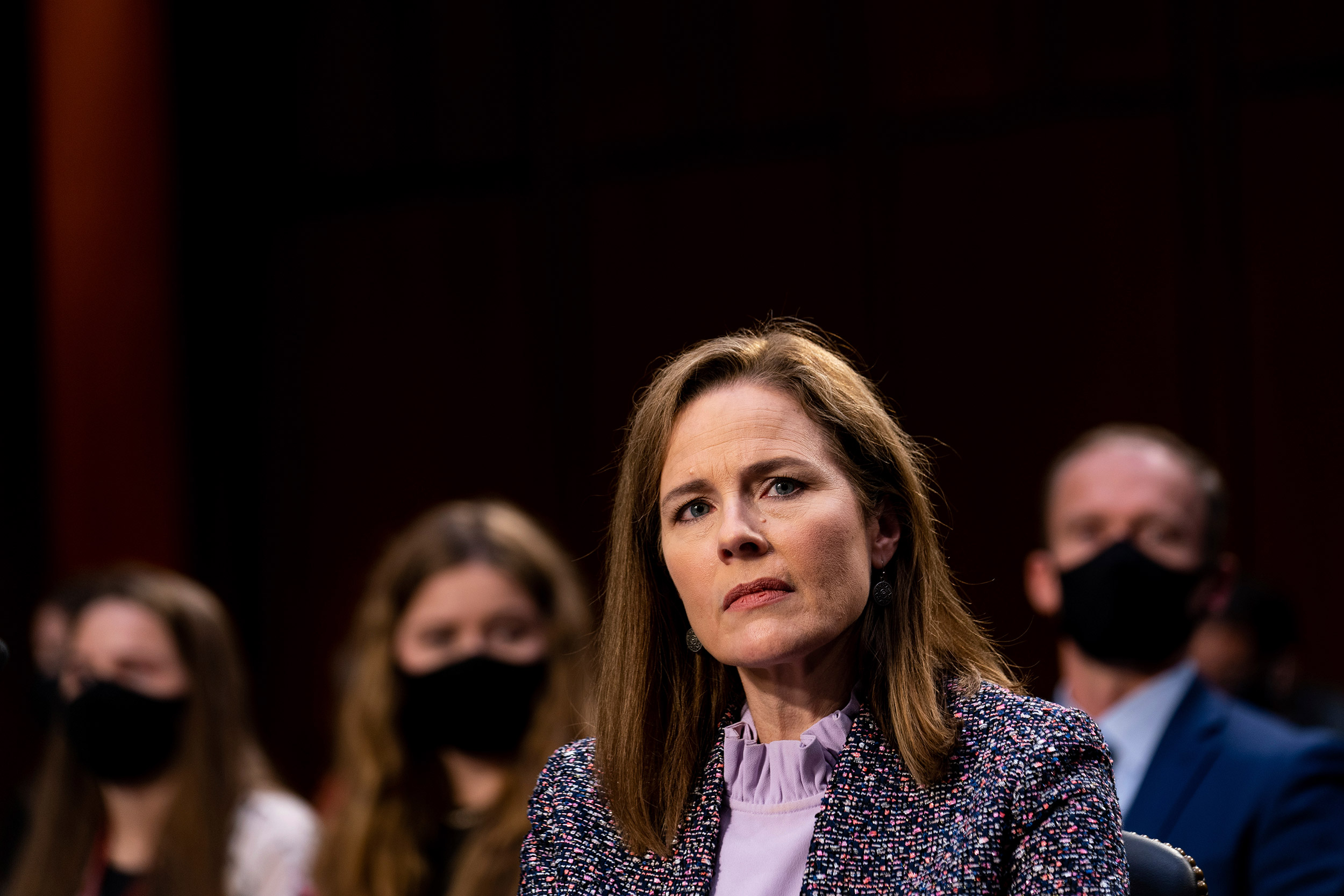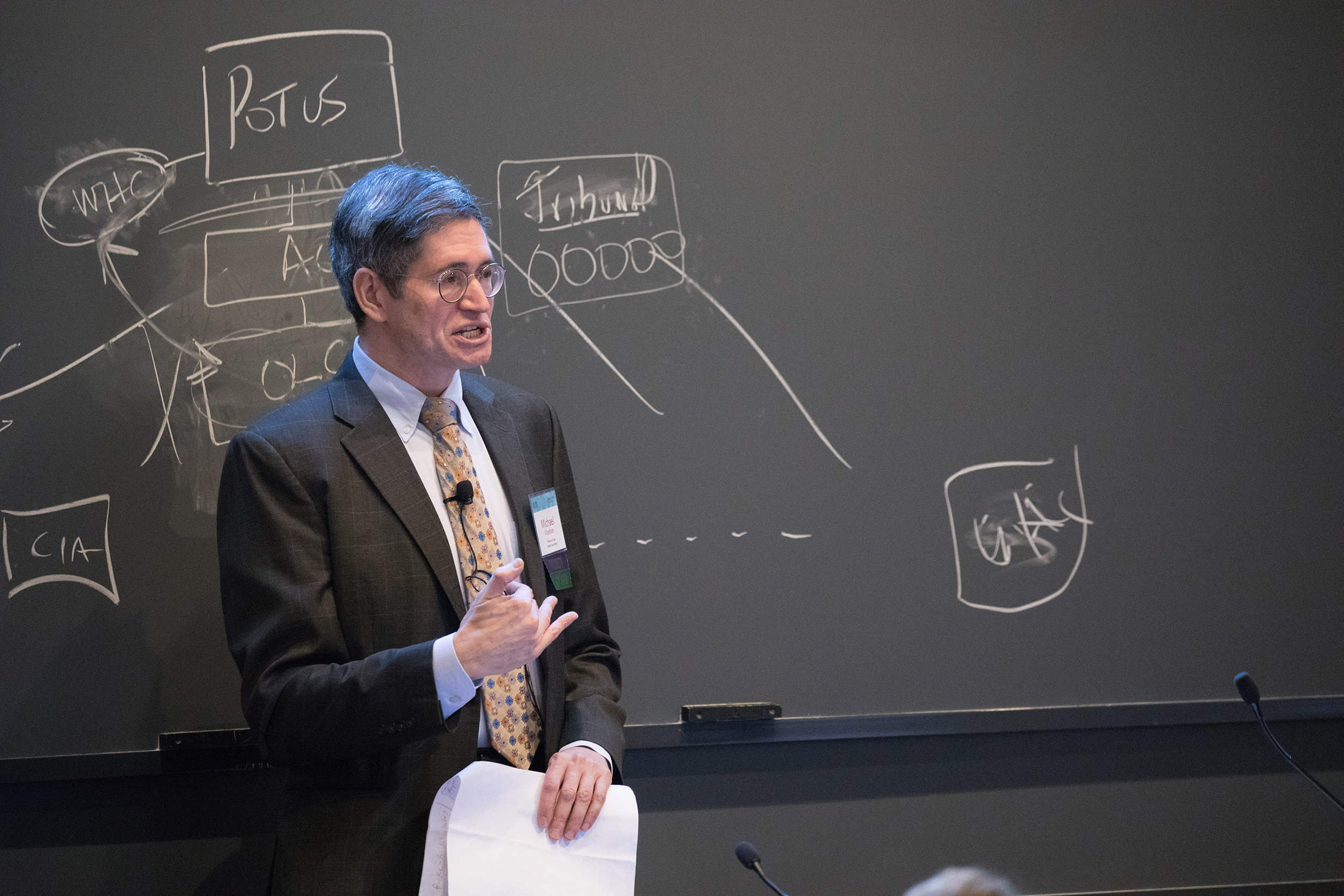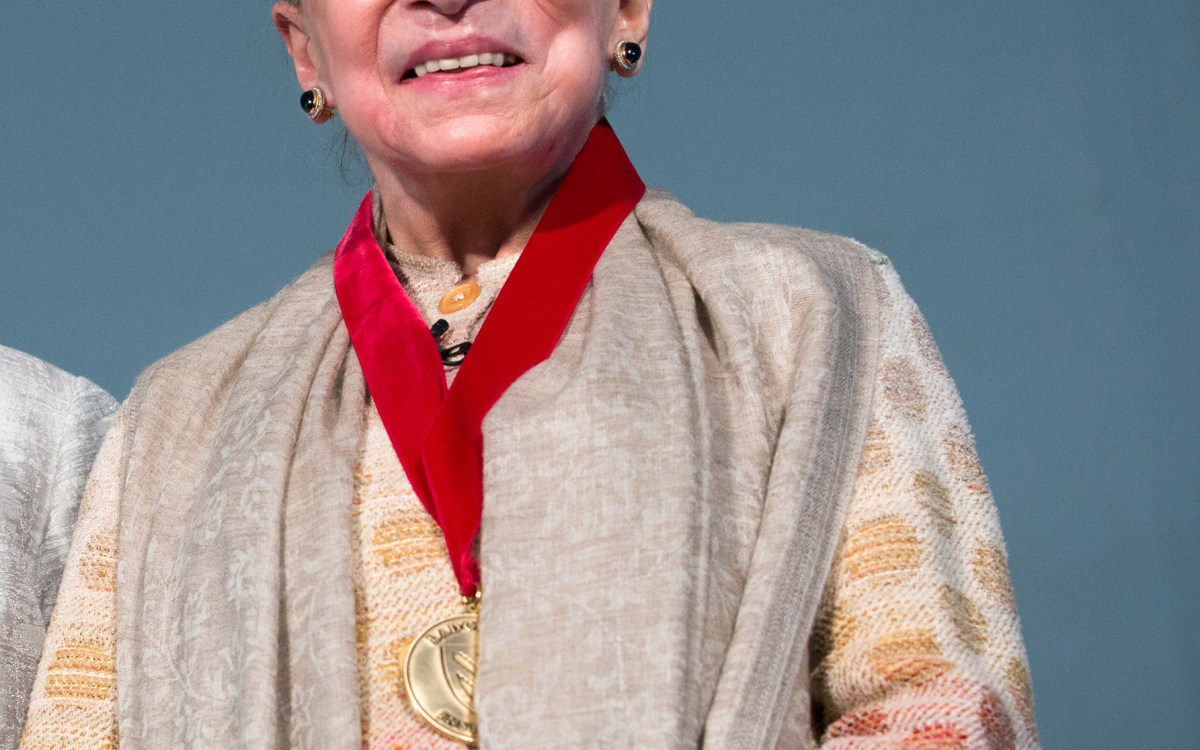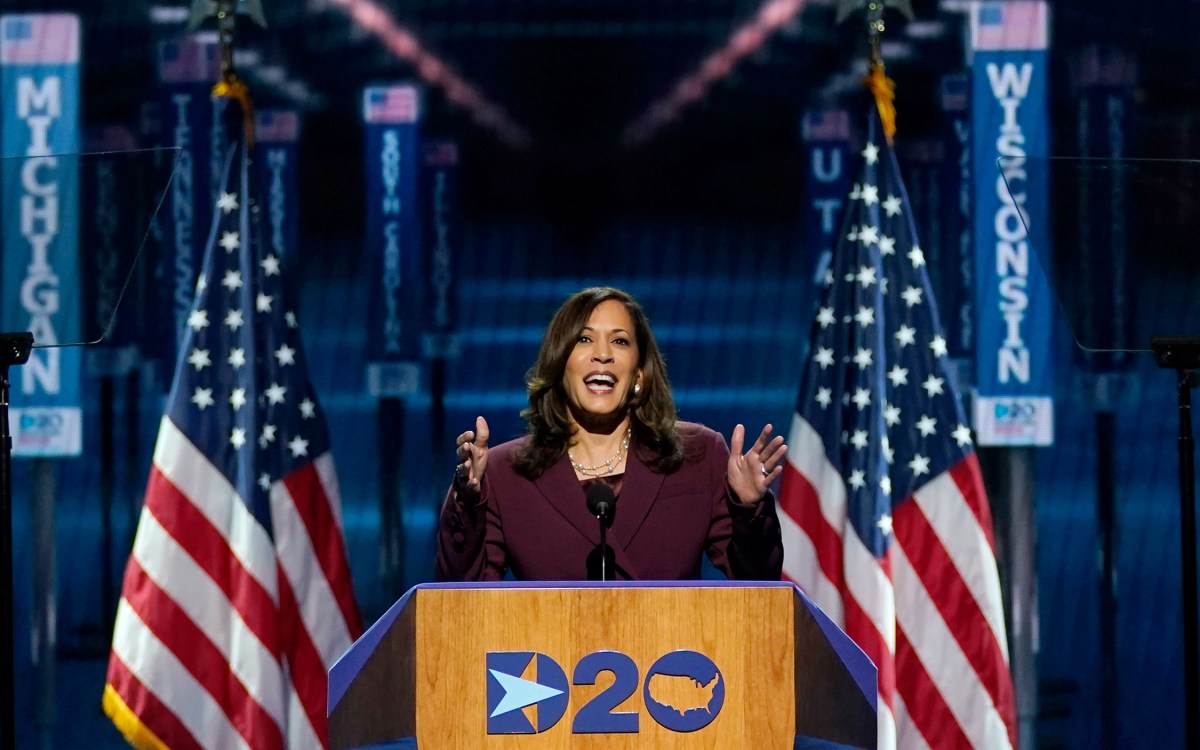
Supreme Court nominee Amy Coney Barrett listens during a confirmation hearing before the Senate Judiciary Committee on Oct. 14.
Erin Schaff/The New York Times via AP, Pool
Do justices really set aside personal beliefs? Nope, legal scholar says
Klarman sees trouble ahead in large conservative majority on Supreme Court
The Senate Judiciary Committee wrapped up hearings Thursday on the nomination of Judge Amy Coney Barrett to the Supreme Court and set a panel vote for Oct. 22, with final confirmation expected before the Nov. 3 election. Legal experts say the addition of President Donald Trump’s conservative nominee will move the court farther right than it has been in decades. Barrett has said her judicial philosophy involves an impersonal focus on the language of the Constitution and intent of the framers. She assured senators during the hearings that she would be guided by that approach and not her own personal beliefs, despite having taken public positions on some hotly disputed issues, most notably her opposition to abortion rights and questioning of the Affordable Care Act. The Gazette interviewed Michael Klarman, an authority on constitutional law and history and Kirkland & Ellis Professor of Law at Harvard Law School, about the limits of judicial philosophy and prospect of having a heavy conservative majority on the court.
Q&A
Michael Klarman
GAZETTE: How concerned are you about the nomination of Judge Amy Coney Barrett to the Supreme Court?
KLARMAN: I’m very concerned, but it has nothing to do with her personally. Any nomination made by President Trump, or indeed any other Republican president, would shift the Supreme Court significantly to the right. It’s actually important to emphasize this, because while I believe Trump himself is a threat to democracy in many different ways, whom he appoints is likely to be no different from whom Mitt Romney or John McCain would have appointed to the Supreme Court.
I’m concerned because Judge Barrett has given speeches suggesting that she might defer less to precedent than Justice Antonin Scalia, her mentor. Justice Scalia was famous for saying he was a textualist, but he wasn’t crazy. I assume that Barrett would be at least as willing as Scalia to overturn precedent, and maybe more so. Scalia would have happily overturned Roe v. Wade; he’s on record as having said that. Justice Barrett would probably overturn Roe v. Wade, or at least gut the decision. She almost certainly would have invalidated the Affordable Care Act in 2012. Justice Scalia voted to do so. She would almost certainly gut race-based affirmative action in the same way that Justice Scalia was on record as wanting to do away entirely with it. She’d almost certainly expand the Second Amendment. She’d likely gut almost all campaign finance regulation. She’d expand rights to religious exemptions under the First Amendment, which includes probably overturning a Scalia opinion from 30 years ago, which I think shows how radical the right of the court has become in the last 30 years. They actually are not satisfied with Justice Scalia’s own [more narrow] interpretation of the First Amendment, but want to expand it to carve out exemptions for religious groups. Judge Barrett would probably strike down disparate racial effects tests under the 14th Amendment, meaning that the federal government would no longer be permitted to bar voting practices that have only a disparate impact on African Americans or Latinos.
GAZETTE: If Judge Barrett is confirmed, what can we expect in terms of the ideological balance of the court?
KLARMAN: The difference most immediately is that Chief Justice John Roberts will no longer be the swing vote. Chief Justice Roberts provided a fifth vote with the liberals to uphold the Affordable Care Act in 2012, to strike down the census question on citizenship in 2019, to uphold DACA [Deferred Action for Childhood Arrivals], and to strike down a Louisiana abortion law last term. Now Roberts will, in a sense, become irrelevant. Justice Brett Kavanaugh will probably be the swing justice once Amy Barrett joins the court. But this was already the most conservative court in almost 100 years.
GAZETTE: You have said there has been a conservative dominance in the Supreme Court for the last 50 years. How do you explain that?
KLARMAN: I’ll preface my answer by noting what Sen. Mitt Romney said the other day to explain why he’d vote to confirm Barrett. Romney said that liberals have gotten used to the idea that they should control the Supreme Court, and he thought that was not really justified because, according to him, a center-right country should have a center-right court. That’s a ludicrous statement on three different grounds. Liberals have not controlled the Supreme Court for 50 years. The last time there was a Democratic and a liberal majority was in 1969, when Chief Justice Earl Warren retired, and Justice Abe Fortas was forced off the court. Secondly, the court is not center-right. This is clearly the most conservative court since the 1930s, when the court gutted the New Deal. Thirdly, this is not a center-right country. Democrats, after Nov. 3, will almost certainly have won the popular vote in seven of the last eight presidential elections. In 2018, Democratic Senate candidates won 18 million more votes than Republican Senate candidates, but Republicans nonetheless control the Senate with a majority of 53 to 47.
There are all sorts of structural biases in the American political system, which makes possible a right-wing court’s governing a center-left country. One of the reasons for that was Sen. Mitch McConnell’s stealing Justice Scalia’s seat from President Barack Obama in 2016. The vagaries of the Electoral College are another big reason. President George W. Bush got two appointments. President Trump will have made three appointments after the Barrett nomination is confirmed by the Senate, and neither of those presidents won the popular vote. That’s five appointments to the Supreme Court that Democrats were deprived of because of the Electoral College system, which no longer has any sound justification. And then there’s the malapportionment of the Senate. Justice Clarence Thomas, Justice Kavanaugh, and Justice Neil Gorsuch were all confirmed by narrow Senate majorities. If you were to reapportion the Senate based on population, then those three justices’ confirmations would have been defeated by the Senate. The same is likely to be true in the Senate’s confirmation of Judge Barrett. When you add the malapportionment of the Senate to the vagaries of the Electoral College and the theft of Scalia’s seat, you see why Republicans have dominated the Supreme Court and are about to dominate it even further.

“Justices are always a product of their times … Brown v. Board of Education was not a conceivable decision except for World War II and dramatic changes in race relations that were initiated or accelerated by the war,” said Michael Klarman, an expert in constitutional law and constitutional history at Harvard Law School.
Photo by Martha Stewart
GAZETTE: There is a widespread belief that justices interpret the law setting aside their personal views and political opinions. How accurate is that?
KLARMAN: Chief Justice Roberts in his confirmation hearing said judges are like baseball umpires calling balls and strikes, and that’s a simply absurd description of what judges do. I doubt if Chief Justice Roberts even believes that; he’s telling people what they want to hear.
If we were candid about what justices interpreting the Constitution really do, then maybe people would decide to take away their power because it is a bit difficult to justify nine unelected, unaccountable, unrepresentative Supreme Court justices making policy on issues like abortion, the death penalty, and campaign finance reform.
Of course, justices pay attention to things like the text of the Constitution and their own precedents, but the text is often open-ended enough in provisions dealing with concepts such as “equal protection” and “due process” that people of different political persuasions will naturally interpret those provisions differently. Precedents can always be broadly or narrowly interpreted, and they can always be overruled by the Supreme Court, so consciously or not, justices are inevitably influenced by their personal values. That’s been true throughout American history.
GAZETTE: What is the role that politics plays in the Supreme Court decisions?
KLARMAN: There are three ways of thinking about “politics.” First, politics can be the judges’ own values. If you’re a woman, like Justice Sandra Day O’Connor, it’s not surprising that you’d be more liberal on issues of gender equality than on issues of federalism. If you’re a Jew, like Felix Frankfurter, it’s not surprising that you’d have a stronger view about the separation of church and state. A second way of thinking about “politics” is as political pressure applied to the court. The justices are not oblivious to the fact that there are limits to what they can get away with politically. One reason that Chief Justice Roberts voted with the liberals in the Affordable Care Act case in 2012 or the census case in 2019 is that he understands that the court has been rendering so many rulings favorable to conservatives, and it’s possible that progressives are about to win a massive political landslide in 2020, and there’s going to be some sort of recompense or retaliation. This is analogous to the switch in 1937, where the court backed off from striking down economic regulation in the face of Roosevelt’s court-packing plan. A third way in which politics influences constitutional decision-making is that the justices reflect the larger social mores of their time. Justices are always a product of their times. Here are some examples: Brown v. Board of Education was not a conceivable decision except for World War II and dramatic changes in race relations that were initiated or accelerated by the war. The court’s decisions of the 1970s protecting women’s equality under the 14th Amendment were not conceivable without the second-wave feminism of the late 1960s. The court’s rulings in favor of gay rights were not conceivable until the 21st century because the court was not going to protect gay rights before the gay rights movement.
Having said all that, it’s really important to emphasize that it matters who’s on the court at any particular moment. Justice Stanley Forman Reed was a Kentuckian who thought that school segregation was constitutionally permissible. If there had been five of him on the court in 1954, then Brown v. Board of Education would have come out the other way. And [the] Obergefell [ruling that guarantees same-sex couples the right to marry] would have come out the other way in 2015 if Justice Anthony Kennedy hadn’t sided with liberals on issues involving gay rights. And the Affordable Care Act case and the census case would have come out the other way if Chief Justice Roberts was not making political calculations about what he thought the court could get away with without jeopardizing its institutional stature.
GAZETTE: Why do politicians, both liberals and conservatives, strive to have dominance in the court if their decisions in the end will follow public opinion or the politics of the time?
KLARMAN: First of all, when we think about the Supreme Court, we tend to think about big constitutional cases like Roe v. Wade or Obergefell, but there are lower-profile cases that are worth literally billions of dollars, which explains why Senate Majority Leader McConnell has made packing federal courts with conservatives his life’s mission and why right-wing billionaires like Charles and David Koch have been willing to invest hundreds of millions of dollars in every electoral cycle over the last decade to elect Republicans and appoint Republican justices. This conservative Supreme Court has decimated class-action litigation, which costs corporations that have misbehaved billions of dollars; it has cut back on antitrust enforcement and has severely limited punitive damages awards. The Trump administration has gutted environmental regulation, which is a large part of the reason why the Koch brothers and others have invested so much money in electing Republican politicians. This is a Chamber of Commerce Court above all things. On social and cultural issues, the liberals still sometimes win, but on the Chamber of Commerce issues, which are the issues that matter to McConnell and right-wing billionaires, this court has been more solidly in their camp than any other court in history.
There is a second category of cases that I would call cases dealing with democracy. The Republican Supreme Court upheld voter-suppression laws in the form of voter ID laws and voter purges. The Republican justices rejected challenges to partisan gerrymandering in 2019, and they struck down a key provision of the Voting Rights Act in 2013. They’ve gutted campaign-finance regulation, and in 2000 they elected a Republican president in Bush v. Gore. Those are tremendous benefits to the Republican Party from having conservative justices. President Trump is quite candid about this; he has said that the reason Amy Barrett must be confirmed to the court quickly is because he needs a ninth justice to rule on contested ballots in the November election.
And the third point is that, as I’ve said, the composition of the court matters enormously, even if the court generally reflects the climate of the era, as Justice [Ruth Bader] Ginsburg liked to say. It matters hugely because if President Obama had appointed the replacement for Scalia rather than Trump’s appointing Gorsuch, there’s no chance that the justices would vote to overturn Roe.
GAZETTE: If the politics of the time and justices’ personal values influence the court’s decisions, what does that say about the role of the Supreme Court as an independent body?
KLARMAN: The first point I want to make is to emphasize a distinction between judicial review, which is striking down statutes, and the rule of law more generally. The rule of law is vitally important, both for the sake of democracy and for the sake of capitalism, because if you don’t have a rule of law, you don’t know whether the criminal justice system is administering fairness or is serving the interests of the dominant political regime. The same thing is true about contracts. If you live in a regime where judges can be bought by the dominant forces in society, you can’t trust that contracts will be enforced, and without contract enforcement, you’re not going to have capitalism. Any society that wants the rule of law, a fair criminal justice system, and enforcement of contracts needs independent judges.
The second part of the answer requires analyzing the virtues and vices of allowing judges to strike down statutes, because such a system is not inevitable. One virtue, I suppose, is that the practice of judicial review [empowering courts to invalidate statutes as unconstitutional] provides some finality to contested issues such as in Bush v. Gore, when the controversy arguably was threatening to tear the nation apart. Independent judges might be good at providing some measure of protection to minorities, but the court doesn’t do a great job of that. Today’s Supreme Court didn’t strike down the Muslim travel ban, which was an obvious instance of religious animus, and during World War II it didn’t strike down Japanese-American internment. The Roberts Court has actually intervened against democracy and declined to defend democracy. The vice of the system is pretty obvious: You’ve got nine unelected, relatively unaccountable judges making political judgments on abortion, the death penalty, and affirmative action. And that’s a weird system to have in a democracy.
GAZETTE: In your view, how should justices approach the law?
KLARMAN: If justices are doing things like enforcing contracts or the criminal justice system, I want them to be neutral arbiters who try to abstract from who the parties in the case are, and try to figure out what the legal rules are. If we’re talking about judicial review, you’d want to appoint judges who will bend toward justice and equality. I understand those are contested terms, but what I mean is that if you had a system with slavery, you would want abolitionist judges who, when there was some open-endedness in the law, would bend their interpretations against slavery. If you had judges in Nazi Germany, you would want them to bend the law against persecution of Jews. If you had judges in apartheid South Africa, you would want them to render rulings that tried to lean against the apartheid system. So that means Brown v. Board of Education is right because it tried to push us in favor of racial justice and equality, and Dred Scott was wrong because it defended the rights of slave owners. Roe v. Wade was right because it was important for women’s equality, and Plessy v. Ferguson was wrong because it upheld racial segregation, which is unjust.
The court today should try to resist the Republican Party’s assault on democracy, and the Republican justices shouldn’t rule in favor of Republican vote suppression just because they are Republicans themselves. But it’s asking a lot of people to somehow abstract from their own positions. In today’s world, we’re so divided; we not only don’t agree about basic facts, but we’re all able to tell ourselves stories that enable us to interpret circumstances and facts in the way that best serves our understanding of the world.
“I’m of the view that Democrats have no choice but to enlarge the size of the court.”
GAZETTE: What do you expect to happen if Democrats win the presidential election?
KLARMAN: I’m of the view that Democrats have no choice but to enlarge the size of the court. The main argument against enlarging the size of the court is that it would lead to a retaliatory cycle where the Democrats increase the number of justices from nine to 13, and when the Republicans gain control of the presidency and the Senate, they increase it to 17 instead of 13.
There are three responses to that concern. First, the Republicans packed the Court first; they started it by stealing the seat that belonged to President Obama to fill. Nobody in history ever did that. Mitch McConnell said there is precedent for not appointing a new justice in the last year of a president’s term, but he just made that up. He lied. In other words, Democrats are not initiating this spiral. They are simply responding in kind; they are entitled to control the court because of when Justice Scalia died.
Second, Republicans will pack the court the first time it suits their interests regardless of what Democrats do; they’ve just confirmed that since Justice Ginsburg’s death by engaging in the hypocrisy of doing what they just refused to allow Obama to do four years earlier. They are blatant hypocrites and don’t even try to make an argument in defense of confirming Judge Barrett. They are simply saying, “We have the power; we’re going to do it.”
The third argument that this won’t lead to a retaliatory cycle is this: If Democrats win, as they are likely to do, they would have to pass democracy-entrenching legislation, by which I mean simply making it easier to vote, doing away with partisan gerrymandering, making Election Day a holiday, making voter registration automatic, ensuring more days of early voting, and making sure that Black people in Atlanta don’t have to wait five hours to vote while white people in Cambridge wait just 30 seconds to vote. If you do all of that, the Republican Party will never win another election unless Republicans change their policies to make them more appealing to people. They’ll have to give up their racism, their misogyny, their homophobia, and xenophobia. They’ll have to give up their aversion to universal health care, to raising the minimum wage, and to providing free college education and free childcare for parents of young children. All of these policies command substantial majority support in public opinion.
Republicans will have to become a reasonable party that responds to dominant public opinion. But the Supreme Court could strike down everything I just described, and that’s something the Democrats need to fix. If they do that, the Republican Party will become a different Republican Party, and Republicans might very well admit that they lost their sense of balance and that they became a little bit crazy, and we could start over again with two reasonable parties that just disagree a little bit about how interventionist government should be and how high taxes for wealthy people should be, rather than having one party that no longer believes in democracy, a party that builds walls on the Mexican border, that bans Muslims migrating to the United States, a party that has hardly any representation in its leadership other than white Christian males, a party that doesn’t reflect the United States in the year 2020.
This interview has been condensed and edited for length and clarity.







